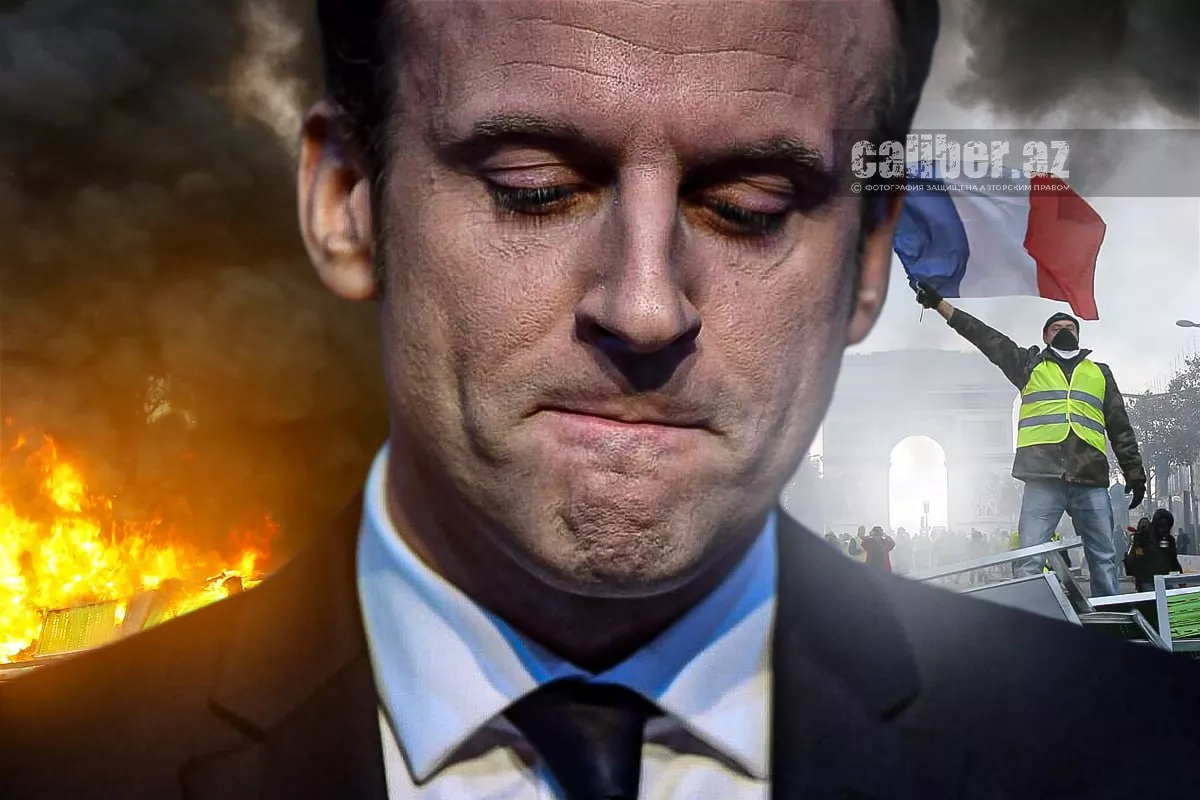Macron's failed vision: How French president lost touch with people Article by Unherd
The UK news website Unherd has published an article criticising the presidency of Emmanuel Macron. Caliber.Az presents an analysis of the piece for its readers.
The article offers a detailed and critical analysis of French President Emmanuel Macron's leadership and his role in the current political crisis facing France. The piece paints a picture of a leader whose miscalculations and aloofness have brought the country to a precarious point, with his popularity at a historic low and his political future in doubt.
The article argues that while Macron is not entirely responsible for the broader political crisis in Western democracies, he bears a significant amount of blame for France’s current situation. His leadership has been characterized by several political missteps, most notably his high-handed dissolution of parliament, which led to a divided National Assembly and a near-constant political standoff.
His repeated miscalculations, such as his failure to build a cohesive parliamentary majority and his attempt to govern from an elitist, detached position, have eroded his credibility and weakened his authority.
A central theme of the article is Macron’s vision of the presidency, which he modeled on a "Jupiterian" style of leadership — detached, omnipotent, and above the political fray. The piece critiques this vision, suggesting that it was out of touch with contemporary French politics and society.
Macron’s attempt to adopt a monarchical role in a modern democracy, akin to de Gaulle's leadership style, has not resonated with the French people. The article highlights how this approach — rooted in intellectual elitism — has alienated large segments of the population, especially as Macron's policy decisions have often favored the elite while neglecting the concerns of everyday citizens.
The article examines how Macron’s neoliberal policies, such as labor market reforms, austerity measures, and tax cuts for the wealthy, have fueled discontent among the French public. His handling of issues like climate change and the Gilets Jaunes protests further amplified public frustration. Macron's responses, including dismissive comments to ordinary citizens, like suggesting an agricultural worker retrain for a job in the service sector, were seen as out of touch with the struggles faced by many French citizens. These economic policies, which Macron justified as necessary for France’s global competitiveness, were deeply unpopular and contributed to his declining approval ratings.

The article also touches on the rise of the far-right National Rally, led by Marine Le Pen, and how Macron’s leadership has failed to curb this political shift. It argues that while Macron did not create the conditions for the far-right’s rise, his inability to address the root causes of their appeal has exacerbated the political polarization in France. Macron’s failure to foster unity and his continued pursuit of unpopular policies have allowed the hard-right to gain momentum.
The article highlights recent events, such as the no-confidence vote and the political maneuvering around Macron's prime ministerial appointments, as evidence of his failing leadership. Macron’s inability to maintain a stable government and his resorting to undemocratic measures, like using Article 49.3 of the constitution to bypass parliamentary opposition, only further alienated the public.
Macron’s failure to take responsibility for his actions — as exemplified by his refusal to resign after political defeats — is a key point in the article, drawing a stark contrast to the actions of former leaders like Charles de Gaulle, who took responsibility for his failures and resigned.
Despite his political challenges, the article notes that Macron continues to project an image of grandeur, particularly through symbolic gestures like hosting the Paris Olympics and overseeing the reconstruction of Notre-Dame. These actions are presented as attempts to preserve his legacy, but the article suggests that these efforts are not enough to overcome the deep dissatisfaction with his presidency. Macron’s insistence on portraying himself as a regal, unifying figure seems out of touch with the reality of his political failure.
In its conclusion, the article argues that while Macron may not be solely responsible for the political turmoil in France, he certainly deserves a large share of the blame. His failure to adapt his leadership style to the realities of modern French politics, combined with his economic policies and inability to unite the country, has left him with a tarnished legacy. The piece suggests that whether or not Macron completes his second term, his presidency is likely to be remembered as a failed one, with a significant role played by his own actions.
The article presents a highly critical view of Emmanuel Macron, focusing on his inability to connect with the French people and his failure to navigate the complex political and economic challenges of his presidency. It underscores the consequences of his "Jupiterian" leadership style and his detachment from the realities of governance in a modern democracy.
While the article acknowledges broader political trends in France and other Western democracies, it ultimately places much of the blame for the current crisis squarely on Macron's shoulders. The analysis is comprehensive, drawing on historical comparisons, recent political events, and Macron’s leadership decisions to argue that his presidency has been marked by arrogance, miscalculations, and a failure to address the needs of the French people.
By Vafa Guliyeva








